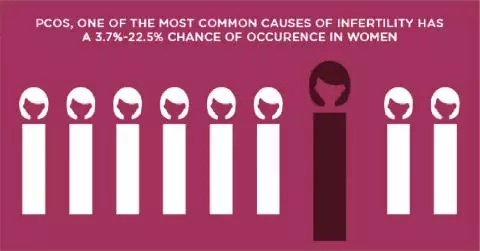Understanding Prolactin and Its Impact on Fertility and Conception

There are a multitude of factors involved in becoming pregnant; hormones are an essential part of this equation, and managing them can be critical to a healthy pregnancy.
For individuals or couples wanting to become pregnant, it is essential to first establish their health or reproductive status. One of the most important issues is the link between excessive prolactin and infertility, which might result in hormonal imbalances.
This page discusses what is prolactin in women, relationships between prolactin and fertility, and more.
What is Prolactin?
Prolactin is a hormone secreted by the pituitary gland, situated at the base of the brain. Prolactin promotes the growth and development of a woman's breasts, as well as the production of milk after childbirth. Prolactin is naturally found in both women's and men's bloodstreams. Other hormones known as prolactin inhibiting factors, including dopamine, regulate prolactin levels. During pregnancy and breastfeeding, levels of prolactin increase which is quite normal. However, if high prolactin levels are not related with pregnancy, it may cause side effects.
While prolactin is not a common hormone to hear about, an excess of prolactin levels in the blood causes hyperprolactinemia. Side effects of high levels of prolactin and resultant hyperprolactinemia may include irregular periods as well as testosterone and oestrogen deficiencies, making conception difficult.
Hyperprolactinemia (High prolactin levels)
- Hyperprolactinemia is when an individual's bloodstream contains higher-than-normal concentrations of the hormone prolactin, responsible for the production of breast milk.
- The disorder affects both women and men, resulting in fertility issues (difficulty conceiving) or infertility.
- In women, elevated prolactin levels can interfere with reproductive hormone levels, resulting in ovulation issues and irregular periods.
- Male infertility can result from hyperprolactinemia, which causes low or absent production of sperm, low levels of testosterone, erectile dysfunction, and low sexual drive.
- Prescription drugs are usually prescribed to manage hyperprolactinemia and assist patients in getting pregnant.
High prolactin Causes
As stated earlier, elevated prolactin levels are mainly produced by pregnancy or breastfeeding. However, in about 30% of women having hyperprolactinemia, the cause is unknown. There can be various causes of high prolactin levels, including:
- Stress
- Sleep deprivation
- Lack of exercise
- Hypothyroidism
- A diet rich in protein or fat
- Medications for anxiety, depression, or related problems
- kidney insufficiency
- adrenal gland insufficiency
- Injuries to the chest wall or spinal cord
- Pituitary tumours (not cancerous, for example, prolactinomas)
- Herbs such as fennel seeds, fenugreek, and red clover
- Nipple stimulation
Symptoms of High Prolactin Levels
Women and men both might encounter the following:
- Infertility
- Reduced sexual drive
- Bone loss
Women may additionally experience:
- Missed or irregular menstruation
- Breast discharge
- Vaginal dryness
- Hot flashes
- Production of breast milk occurs even if you are not pregnant or breastfeeding.
- Tender breasts
Men may additionally experience:
- Poor sperm count
- Erectile dysfunction
- Reduced muscle mass and body hair
- Enlargement of the breast
- Low testosterone levels
Symptoms of High Prolactin Levels
Elevated Prolactin and Fertility in Women
The American Society for Reproductive Medicine states that hyperprolactinemia typically impacts around one-third of childbearing-age women who have normal ovaries but have irregular menstrual cycles.
Hyperprolactinemia disrupts a woman's reproductive system by reducing gonadotropin-releasing hormone (GnRH), which typically surges when the female body releases an egg from the ovary. This, in turn, reduces the pituitary gland's production of luteinizing hormone (LH) and follicle-stimulating hormone (FSH), the hormones that promote the growth of eggs and ovulation. This can lead to either anovulation (ovulation not occurring at all), which is a direct reason for infertility, or disturbed ovulation, which can contribute to or cause infertility.
Elevated Prolactin and Fertility in Men
Hyperprolactinemia in men can also hinder GnRH production, which in turn inhibits the pituitary's ability to signal the testicles to produce sperm and testosterone. As a consequence, the production of sperm and testosterone levels may drop. Low testosterone levels can cause an inability to sustain an erection during sexual activity and a decrease in sexual desire, both of which can hamper the man's ability to impregnate his partner.
Diagnosing High Prolactin Levels
A fertility doctor will most likely do a physical exam to check for any obvious signs and symptoms, such as breast discharge. In addition, the doctor will perform a blood test to evaluate prolactin levels. If a patient's prolactin level is high in the blood, the doctor can ask for a repeat test under specific conditions:
- While the patient fasts
- After establishing that the patient is in the appropriate phase of the menstrual cycle (in women). Prolactin levels are frequently more following ovulation, so it is necessary to monitor fasting levels during the follicular phase of the period.
A retest is also necessary to ensure that the initial increase is not a transient aberration.
If the level increases slightly and there is no apparent cause (such as being pregnant, breastfeeding, medications, or thyroid issues) and there are no neurological symptoms such as recurrent headaches or tunnel vision, a fertility specialist may advise medical treatment without additionally recommending brain imaging. If the hormone levels are moderate to significantly increased or if the patient demonstrates any major neurological symptoms, the specialist will most likely propose a pituitary gland investigation utilising a brain MRI.
Treatment of High Prolactin Levels
If you have mild signs or none whatsoever, you may not require treatment. Still, it's a good idea to tell your doctor if you have any symptoms or are having problems getting pregnant.
Treatment for hyperprolactinemia is determined by the underlying cause. The objective of treatment may not be limited to restoring prolactin levels to normal but also to ensuring the pituitary gland functions effectively, shrinking any tumour, and correcting any consequent issues, particularly those related to fertility.
- If a person's medications are contributing to the elevated prolactin, alternative medications can be tried, or additional medications may be given to counter their effects. Thyroid replacement drugs can be used to treat hypothyroidism.
- If no cause is found, or if the condition is caused by a prolactinoma, medicine is usually prescribed. Two dopamine agonist drugs, bromocriptine and cabergoline, are used to reduce prolactin levels, shrink tumours, improve menstrual cycle irregularity, and possibly reduce nipple milk discharge. Males can take these medicines to improve decreased testosterone levels and the production of sperm caused by hyperprolactinemia. These drugs are frequently prescribed at a low dose and increase over time until prolactin levels normalise. The drugs will be continued until the patient is able to conceive and normal menstrual cycles resume.
- Surgery may also be performed if the underlying cause is a tumour and other treatments have failed. Radiation is rarely utilised. However, it can be used as a last resort if other treatments and surgery have failed.
Patients who were unable to conceive simply because of hyperprolactinemia alone are usually able to do so once their prolactin levels have returned to normal with medication.
How to Reduce Prolactin?
Along with the medical treatment, you can take the following measures to reduce prolactin:
- Stress management through activities like meditation, yoga, and regular exercise
- Avoid excessive exercise, as this may stimulate prolactin levels.
- Balanced diet and proper nutrition
Normal prolactin levels to get pregnant
The normal ranges for levels of prolactin can vary considerably between laboratories. If you have any questions regarding your results, refer to the range of normal levels given on the laboratory report or consult with your doctor.
In general, typical prolactin readings include the following:
- For males: below 20 ng/mL (nanogram per millilitre).
- For females who are not breastfeeding or pregnant: below 25 ng/mL.
- Pregnancy and breastfeeding: 80–400 ng/mL.
When this hormone surpasses 100 ng/mL, reproduction can be impaired. Elevated levels can cause polycystic ovaries syndrome (PCOS), hypothyroidism, stress, and the development of an ovary cyst or pituitary prolactinoma.
Things You Need to Know If You are Trying to Conceive and Have Hyperprolactinemia
If you are trying to get pregnant and are diagnosed with hyperprolactinemia, you should know that while it can lead to fertility problems, it is a manageable condition. If your doctor finds that your prolactin levels are high, they may recommend a number of treatment options, including medications to lower your levels of prolactin, synthetic hormone replacements, and even surgery. If you are worried that your high prolactin levels are impacting your chance of being pregnant, you may discuss it with your physician so they can create a suitable treatment strategy for you.
A combination of drugs is useful for treating high prolactin levels, but lifestyle adjustments can also help lower them. Common factors that can raise prolactin levels include low blood sugar levels, excessive exercise, and some psychiatric medications. Ask your doctor about these factors as well, particularly if you've been trying to conceive.
Overall, if you happen to have hyperprolactinemia and struggling to conceive, you shouldn't be too concerned because therapy options are very effective. However, additional factors are likely to be responsible for your infertility; therefore, your doctor will most likely want to perform a full reproductive workup. Identifying the primary cause of infertility or difficulty conceiving will help them choose the appropriate treatment plan.
 Infertility Counselling
Infertility Counselling Female Infertility Treatment
Female Infertility Treatment Andrology Treatment
Andrology Treatment Fertility Enhancing Surgeries - Female
Fertility Enhancing Surgeries - Female Fertility Enhancing Surgeries - Male
Fertility Enhancing Surgeries - Male Endoscopy Treatment
Endoscopy Treatment IUI Treatment
IUI Treatment IVF Treatment
IVF Treatment ICSI Treatment
ICSI Treatment Advanced IVF Solutions
Advanced IVF Solutions Embryology
Embryology Vitrification Egg, Embryo, Sperm Freezing
Vitrification Egg, Embryo, Sperm Freezing Preimplantation Genetic Testing (PGT)
Preimplantation Genetic Testing (PGT) Donation Program Embryo / Egg / Sperm
Donation Program Embryo / Egg / Sperm Self-cycleTM IVF
Self-cycleTM IVF

 Self-cycleTM IVF
Self-cycleTM IVF











